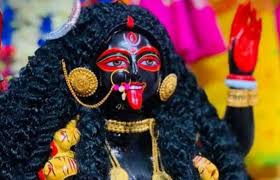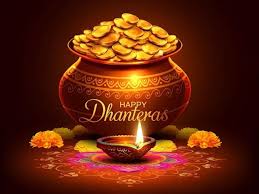Kali Chaudas 2024: Significance, Story, Date, and Time in the UK
In 2024, Kali Chaudas, also known as Bhut Chaturdashi or Narak Chaturdashi, falls on Wednesday, 30th October. For devotees in London and across the UK, the Muhurat for Kali Chaudas is from 23:16 to 00:13 on 31st October, with a duration of 57 minutes. This day, which is part of the wider Diwali celebrations, holds immense spiritual significance and is devoted to Goddess Kali, the fierce form of Goddess Parvati. It is also observed as Narak Chaturdashi, marking a day for eliminating negativity and seeking protection from the Goddess.

Meaning of Kali Chaudas
Kali Chaudas, which takes place on the 14th day of the dark fortnight in the month of Ashwin (Kartik in North India), is dedicated to worshipping Goddess Kali. Devotees believe that Kali protects them from evil spirits and negative energies, bestowing courage and strength. On this day, Goddess Kali is worshipped to ward off evil forces and obstacles in life. In some traditions, devotees seek supernatural powers, but most people observe this day as a time for spiritual cleansing and protection.
In the UK, the celebration is a reminder to seek inner strength and fight against negativity, with families performing pujas and offering prayers in their homes and temples. The rituals of Kali Chaudas are performed at night, particularly focusing on invoking the Goddess’s power for protection and well-being.
Legends Associated with Kali Chaudas
Several legends explain the significance of Kali Chaudas. One of the most famous stories is that of Narakasura, a demon who wreaked havoc on Earth and in the heavens. The gods turned to Lord Vishnu, who, in his Krishna avatar, defeated Narakasura on this day. The defeat of this powerful demon is celebrated as Narak Chaturdashi, and Kali Chaudas is closely linked with this victory over evil.
Another legend involves Lord Hanuman, who swallowed the Sun as a child, plunging the world into darkness. On Kali Chaudas, it is believed that the gods pleaded with Hanuman to release the Sun, which eventually restored light to the universe.
How to Observe Kali Chaudas in the UK
For devotees in the UK, Kali Chaudas is an important day for rituals that can be done both at home and in temples. Many UK temples hold special events for Kali Chaudas, offering an opportunity for collective worship. For those observing the day at home, here’s a guide to follow:
1. Perform an Abhyang Snan (ritual bath) in the early morning hours of Kali Chaudas. This bath, traditionally done with sesame oil, is believed to cleanse the body and soul.
2. Prepare offerings such as sesame seeds, rice, ghee, and sweets like ladoos for the Goddess.
3. Decorate the home temple and light lamps to invite positivity and dispel darkness.
4. Sing devotional songs and chant mantras dedicated to Goddess Kali during the Muhurat. Prayers are typically focused on seeking protection, courage, and the removal of obstacles.
In some communities, visiting crematoriums and offering prayers to Goddess Kali and Veer Vetal is a ritual of Kali Chaudas. However, for many in the UK, the day is marked by quiet, reflective worship at home or in temples, focusing on banishing negativity from life.
Astrological Importance of Kali Chaudas
Astrologically, Kali Chaudas is linked to the planet Rahu, which governs the darker aspects of life such as fear, confusion, and hidden enemies. Worshipping Goddess Kali on this day is believed to reduce the malefic effects of Rahu, particularly for those going through difficult astrological periods. The day is considered favourable for resolving conflicts, overcoming fears, and seeking spiritual strength.
Kali Chaudas and Diwali Festivities in the UK
Kali Chaudas forms part of the larger Diwali celebration. While many Hindu families in the UK focus on Lakshmi Puja during Diwali, for communities from Western India, Kali Chaudas is an equally important day. It is celebrated just before Diwali, and those observing it believe it brings strength, courage, and protection for the upcoming year.
Final Thoughts
In the UK, where Diwali is widely celebrated, Kali Chaudas provides an opportunity to connect with one’s roots and reflect on the importance of removing negativity from life. Whether you are observing the festival in a temple or at home, Kali Chaudas is a reminder to seek the divine protection of Goddess Kali. Make sure to observe the correct Muhurat times (23:16 to 00:13 on 31st October 2024) for performing the rituals and seek the blessings of the Goddess for protection and peace.
Recent Posts
4 Days of Pongal 2025, Dates, Rituals, Story, Timings
Pongal is a four-day festival celebrated in Tamil Nadu and across Tamil communities globally to express gratitude to nature for a bountiful harvest. The festival, dedicated to the Sun God, Surya, marks the beginning of the Tamil month of Thai and the harvest season. In 2025, Pongal will be celebrated from Tuesday, January 14 to Friday, January 17. The four days are: Bhogi (January 14, 2025), dedicated to Lord Indra and marking the clearing of old possessions; Thai Pongal (January 15, 2025), the main day for thanking the Sun God for the harvest; Mattu Pongal (January 16, 2025), honoring cattle for their role in agriculture; and Kaanum Pongal (January 17, 2025), a day for family reunions and social celebrations. These days are filled with rituals, significance, and joy, reflecting the rich cultural heritage of Tamil communities worldwide.

Ahoi Ashtami 2024 UK | Is Ahoi Ashtami on 23rd or 24th | Celebrating the Wellbeing of Children
Ahoi Ashtami, a revered festival for mothers, will be celebrated on Wednesday, October 23, 2024. This festival holds special significance for women who fast for the health and wellbeing of their children. Traditionally observed for sons, the modern-day observance includes prayers for the wellbeing of both sons and daughters. The fast is broken during twilight after sighting the stars in the sky, which will occur at 18:24 in London on this day. For those who follow the custom of breaking the fast after moonrise, the moon will rise at 22:14 on Ahoi Ashtami.
Ahoi Ashtami 2025 UK: Date, Time, and Rituals for Wellbeing of Children
Ahoi Ashtami, a significant Hindu festival dedicated to the wellbeing of children, will be celebrated on October 13, 2025. The festival, observed mainly by mothers, involves fasting and performing prayers for the health and prosperity of sons and daughters. The Ahoi Ashtami Puja Muhurat for 2025 is from 18:11 to 19:30 (UK time). This auspicious occasion is marked by devotion and rituals, with many families gathering to perform the prayers at home or at community temples.
Chaitra Navratri 2025 : Date , Calendar and Events in UK
Chaitra Navratri 2025 will be celebrated from March 30 to April 6. For Hindus in the UK, this auspicious nine-day festival is not just a time for religious devotion, but also a meaningful cultural celebration marking the Hindu New Year and the arrival of spring. Also known as Vasanta Navratri, it honours the nine forms of Goddess Durga, symbolizing strength, renewal, and feminine power. In this article, we explore the dates, rituals, significance, and special events happening across the UK for Chaitra Navratri 2025.

Dhanteras 2024 UK: Date, Auspicious Time, Traditions, and Celebrations
Dhanteras 2024 will be celebrated on October 29 in the UK. The auspicious time for Dhanteras puja is from 7:04 PM to 8:27 PM. Discover the significance, traditions, and events happening in London to celebrate this festive occasion.